University Law Assignment: Express and Implied Terms in Company Law
VerifiedAdded on 2022/11/29
|11
|2976
|475
Homework Assignment
AI Summary
This assignment delves into the intricacies of business and company law, focusing on the terms of a contract and the implications of negligence. It begins by defining contract terms, differentiating between express and implied terms, and exploring their impact on contractual obligations and validity. The assignment then analyzes a case study where a customer, Caitlyn, suffered damages due to a metal piece found in her food, leading to a discussion on breach of duty of care and negligence. The legal framework, including the Wrongs Act 1958 (Vic) and relevant case law, is examined. The assignment also covers the five essential elements of a contract (offer and acceptance, consideration, competency, free consent, and lawful nature) with examples. The application of law to the case is discussed using the IRAC method, concluding with an assessment of the Kaffee Shoppe's liability based on the clause printed on the ticket and the principles of negligence under common law and the Australian Consumer Law.
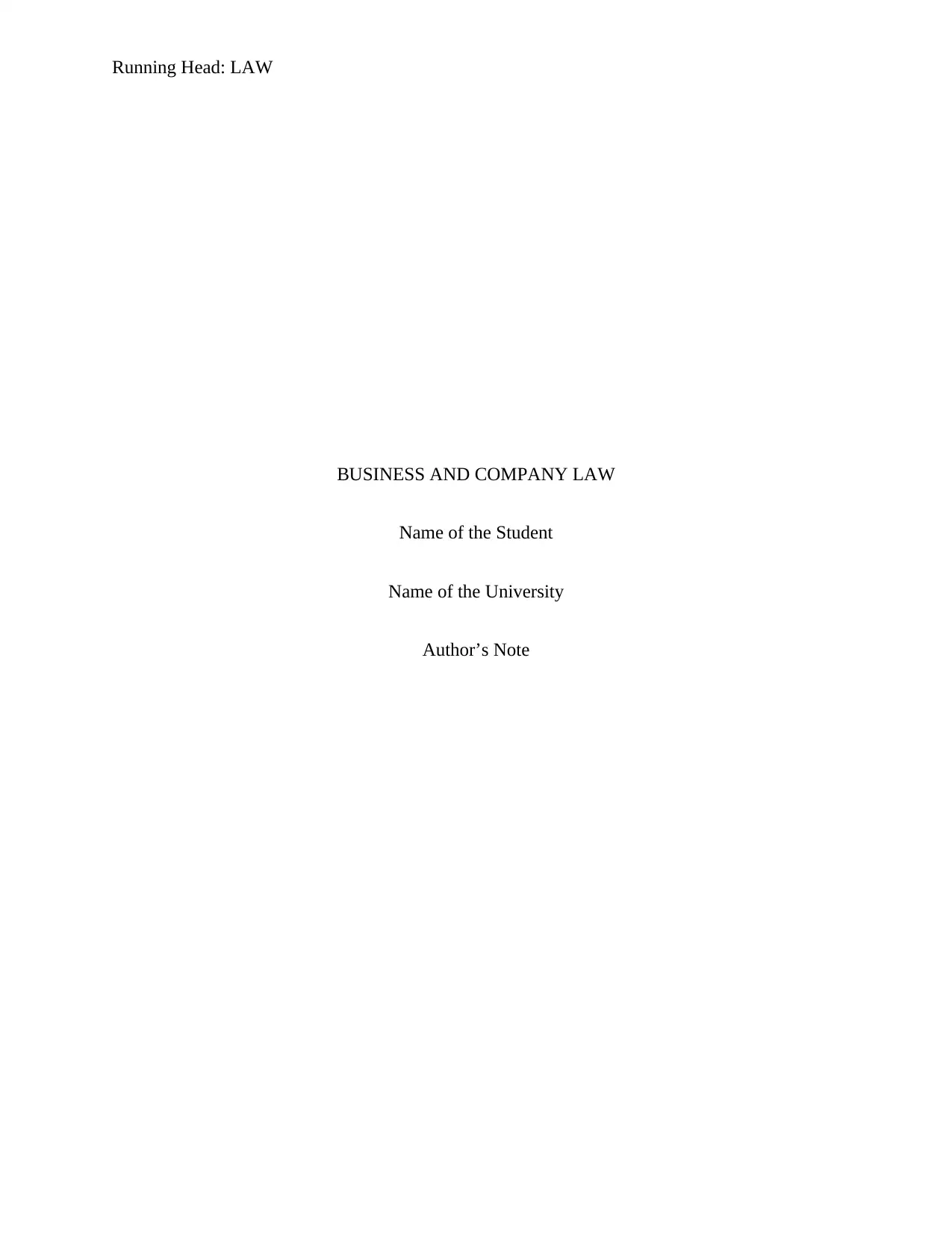
Running Head: LAW
BUSINESS AND COMPANY LAW
Name of the Student
Name of the University
Author’s Note
BUSINESS AND COMPANY LAW
Name of the Student
Name of the University
Author’s Note
Paraphrase This Document
Need a fresh take? Get an instant paraphrase of this document with our AI Paraphraser
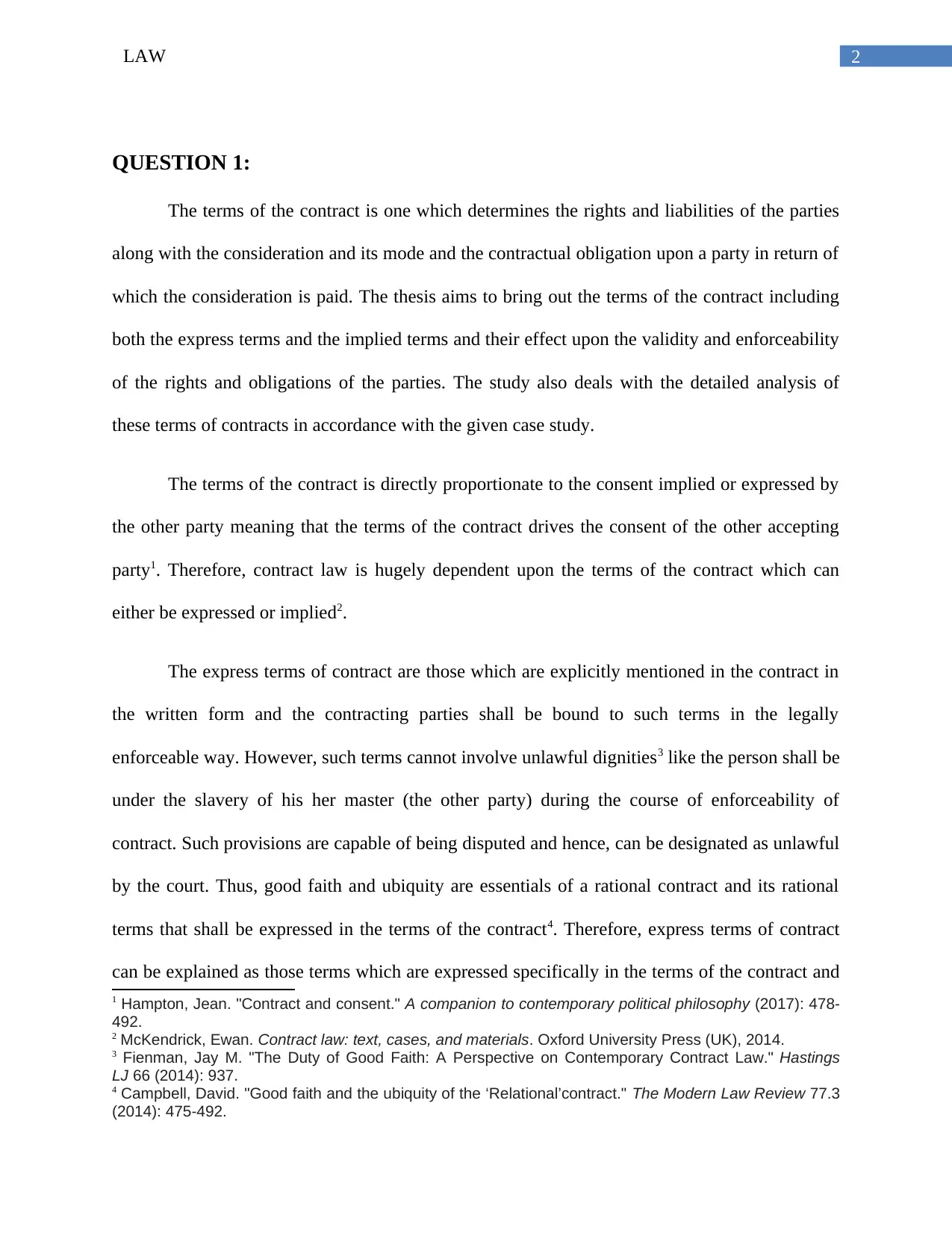
2LAW
QUESTION 1:
The terms of the contract is one which determines the rights and liabilities of the parties
along with the consideration and its mode and the contractual obligation upon a party in return of
which the consideration is paid. The thesis aims to bring out the terms of the contract including
both the express terms and the implied terms and their effect upon the validity and enforceability
of the rights and obligations of the parties. The study also deals with the detailed analysis of
these terms of contracts in accordance with the given case study.
The terms of the contract is directly proportionate to the consent implied or expressed by
the other party meaning that the terms of the contract drives the consent of the other accepting
party1. Therefore, contract law is hugely dependent upon the terms of the contract which can
either be expressed or implied2.
The express terms of contract are those which are explicitly mentioned in the contract in
the written form and the contracting parties shall be bound to such terms in the legally
enforceable way. However, such terms cannot involve unlawful dignities3 like the person shall be
under the slavery of his her master (the other party) during the course of enforceability of
contract. Such provisions are capable of being disputed and hence, can be designated as unlawful
by the court. Thus, good faith and ubiquity are essentials of a rational contract and its rational
terms that shall be expressed in the terms of the contract4. Therefore, express terms of contract
can be explained as those terms which are expressed specifically in the terms of the contract and
1 Hampton, Jean. "Contract and consent." A companion to contemporary political philosophy (2017): 478-
492.
2 McKendrick, Ewan. Contract law: text, cases, and materials. Oxford University Press (UK), 2014.
3 Fienman, Jay M. "The Duty of Good Faith: A Perspective on Contemporary Contract Law." Hastings
LJ 66 (2014): 937.
4 Campbell, David. "Good faith and the ubiquity of the ‘Relational’contract." The Modern Law Review 77.3
(2014): 475-492.
QUESTION 1:
The terms of the contract is one which determines the rights and liabilities of the parties
along with the consideration and its mode and the contractual obligation upon a party in return of
which the consideration is paid. The thesis aims to bring out the terms of the contract including
both the express terms and the implied terms and their effect upon the validity and enforceability
of the rights and obligations of the parties. The study also deals with the detailed analysis of
these terms of contracts in accordance with the given case study.
The terms of the contract is directly proportionate to the consent implied or expressed by
the other party meaning that the terms of the contract drives the consent of the other accepting
party1. Therefore, contract law is hugely dependent upon the terms of the contract which can
either be expressed or implied2.
The express terms of contract are those which are explicitly mentioned in the contract in
the written form and the contracting parties shall be bound to such terms in the legally
enforceable way. However, such terms cannot involve unlawful dignities3 like the person shall be
under the slavery of his her master (the other party) during the course of enforceability of
contract. Such provisions are capable of being disputed and hence, can be designated as unlawful
by the court. Thus, good faith and ubiquity are essentials of a rational contract and its rational
terms that shall be expressed in the terms of the contract4. Therefore, express terms of contract
can be explained as those terms which are expressed specifically in the terms of the contract and
1 Hampton, Jean. "Contract and consent." A companion to contemporary political philosophy (2017): 478-
492.
2 McKendrick, Ewan. Contract law: text, cases, and materials. Oxford University Press (UK), 2014.
3 Fienman, Jay M. "The Duty of Good Faith: A Perspective on Contemporary Contract Law." Hastings
LJ 66 (2014): 937.
4 Campbell, David. "Good faith and the ubiquity of the ‘Relational’contract." The Modern Law Review 77.3
(2014): 475-492.
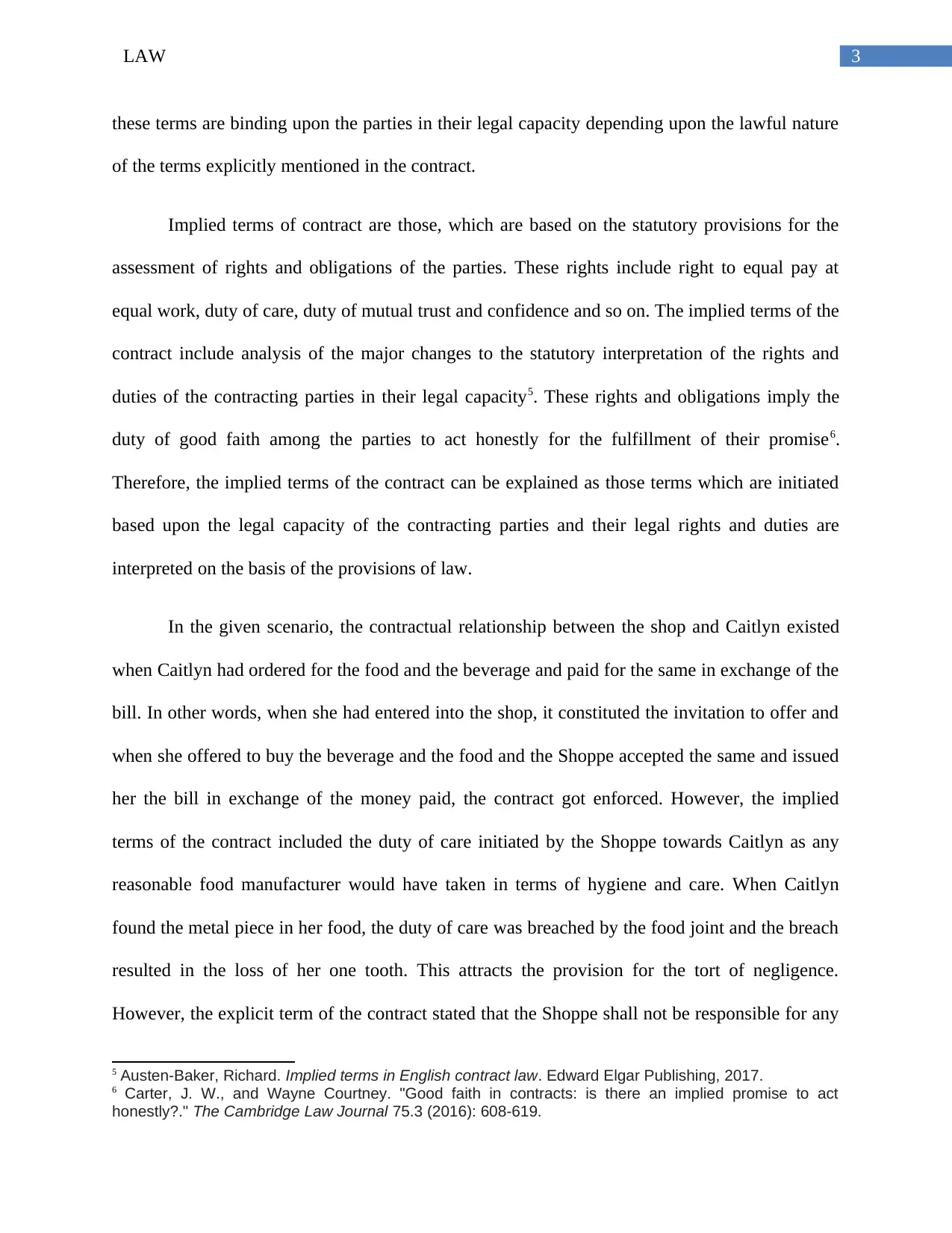
3LAW
these terms are binding upon the parties in their legal capacity depending upon the lawful nature
of the terms explicitly mentioned in the contract.
Implied terms of contract are those, which are based on the statutory provisions for the
assessment of rights and obligations of the parties. These rights include right to equal pay at
equal work, duty of care, duty of mutual trust and confidence and so on. The implied terms of the
contract include analysis of the major changes to the statutory interpretation of the rights and
duties of the contracting parties in their legal capacity5. These rights and obligations imply the
duty of good faith among the parties to act honestly for the fulfillment of their promise6.
Therefore, the implied terms of the contract can be explained as those terms which are initiated
based upon the legal capacity of the contracting parties and their legal rights and duties are
interpreted on the basis of the provisions of law.
In the given scenario, the contractual relationship between the shop and Caitlyn existed
when Caitlyn had ordered for the food and the beverage and paid for the same in exchange of the
bill. In other words, when she had entered into the shop, it constituted the invitation to offer and
when she offered to buy the beverage and the food and the Shoppe accepted the same and issued
her the bill in exchange of the money paid, the contract got enforced. However, the implied
terms of the contract included the duty of care initiated by the Shoppe towards Caitlyn as any
reasonable food manufacturer would have taken in terms of hygiene and care. When Caitlyn
found the metal piece in her food, the duty of care was breached by the food joint and the breach
resulted in the loss of her one tooth. This attracts the provision for the tort of negligence.
However, the explicit term of the contract stated that the Shoppe shall not be responsible for any
5 Austen-Baker, Richard. Implied terms in English contract law. Edward Elgar Publishing, 2017.
6 Carter, J. W., and Wayne Courtney. "Good faith in contracts: is there an implied promise to act
honestly?." The Cambridge Law Journal 75.3 (2016): 608-619.
these terms are binding upon the parties in their legal capacity depending upon the lawful nature
of the terms explicitly mentioned in the contract.
Implied terms of contract are those, which are based on the statutory provisions for the
assessment of rights and obligations of the parties. These rights include right to equal pay at
equal work, duty of care, duty of mutual trust and confidence and so on. The implied terms of the
contract include analysis of the major changes to the statutory interpretation of the rights and
duties of the contracting parties in their legal capacity5. These rights and obligations imply the
duty of good faith among the parties to act honestly for the fulfillment of their promise6.
Therefore, the implied terms of the contract can be explained as those terms which are initiated
based upon the legal capacity of the contracting parties and their legal rights and duties are
interpreted on the basis of the provisions of law.
In the given scenario, the contractual relationship between the shop and Caitlyn existed
when Caitlyn had ordered for the food and the beverage and paid for the same in exchange of the
bill. In other words, when she had entered into the shop, it constituted the invitation to offer and
when she offered to buy the beverage and the food and the Shoppe accepted the same and issued
her the bill in exchange of the money paid, the contract got enforced. However, the implied
terms of the contract included the duty of care initiated by the Shoppe towards Caitlyn as any
reasonable food manufacturer would have taken in terms of hygiene and care. When Caitlyn
found the metal piece in her food, the duty of care was breached by the food joint and the breach
resulted in the loss of her one tooth. This attracts the provision for the tort of negligence.
However, the explicit term of the contract stated that the Shoppe shall not be responsible for any
5 Austen-Baker, Richard. Implied terms in English contract law. Edward Elgar Publishing, 2017.
6 Carter, J. W., and Wayne Courtney. "Good faith in contracts: is there an implied promise to act
honestly?." The Cambridge Law Journal 75.3 (2016): 608-619.
⊘ This is a preview!⊘
Do you want full access?
Subscribe today to unlock all pages.

Trusted by 1+ million students worldwide
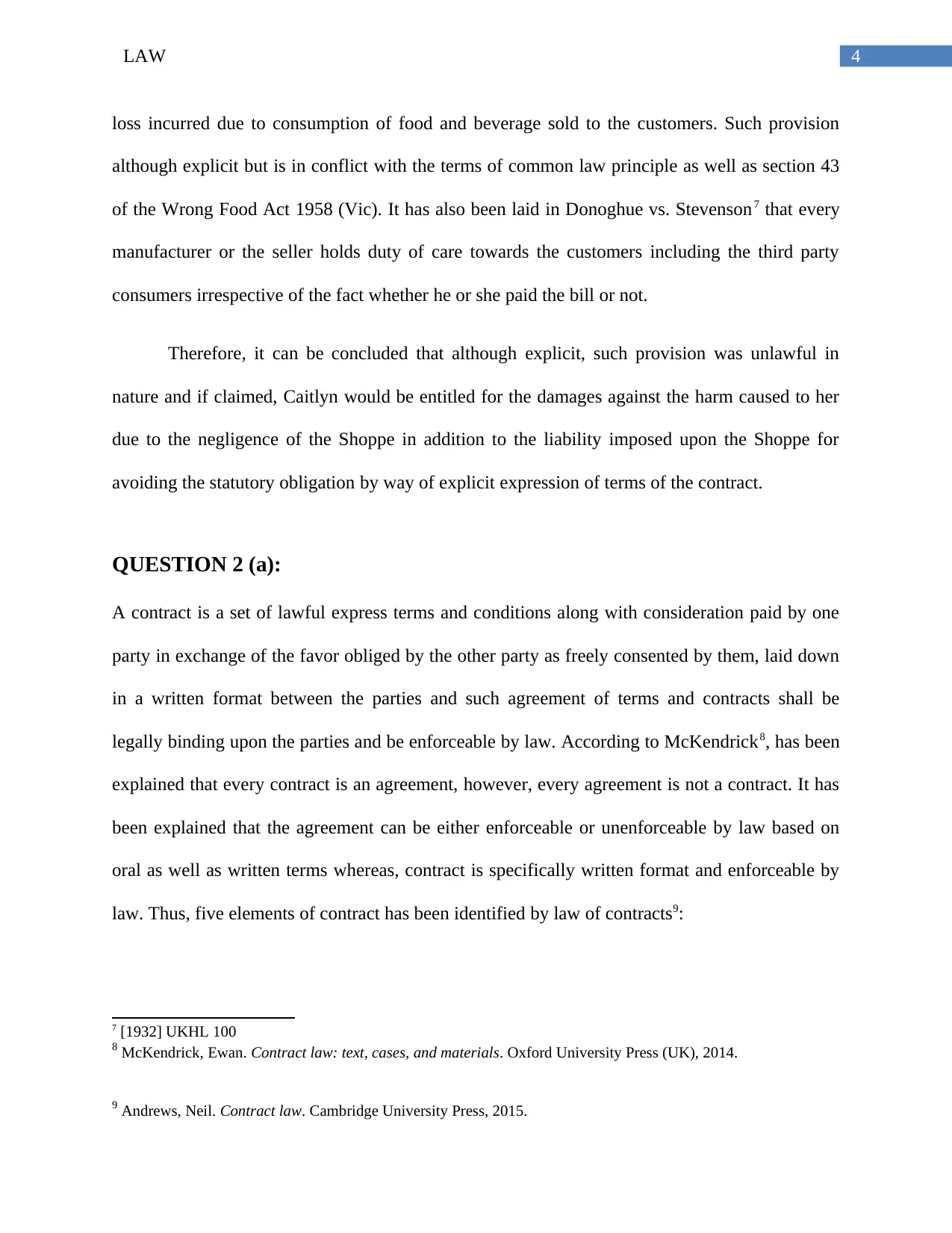
4LAW
loss incurred due to consumption of food and beverage sold to the customers. Such provision
although explicit but is in conflict with the terms of common law principle as well as section 43
of the Wrong Food Act 1958 (Vic). It has also been laid in Donoghue vs. Stevenson7 that every
manufacturer or the seller holds duty of care towards the customers including the third party
consumers irrespective of the fact whether he or she paid the bill or not.
Therefore, it can be concluded that although explicit, such provision was unlawful in
nature and if claimed, Caitlyn would be entitled for the damages against the harm caused to her
due to the negligence of the Shoppe in addition to the liability imposed upon the Shoppe for
avoiding the statutory obligation by way of explicit expression of terms of the contract.
QUESTION 2 (a):
A contract is a set of lawful express terms and conditions along with consideration paid by one
party in exchange of the favor obliged by the other party as freely consented by them, laid down
in a written format between the parties and such agreement of terms and contracts shall be
legally binding upon the parties and be enforceable by law. According to McKendrick8, has been
explained that every contract is an agreement, however, every agreement is not a contract. It has
been explained that the agreement can be either enforceable or unenforceable by law based on
oral as well as written terms whereas, contract is specifically written format and enforceable by
law. Thus, five elements of contract has been identified by law of contracts9:
7 [1932] UKHL 100
8 McKendrick, Ewan. Contract law: text, cases, and materials. Oxford University Press (UK), 2014.
9 Andrews, Neil. Contract law. Cambridge University Press, 2015.
loss incurred due to consumption of food and beverage sold to the customers. Such provision
although explicit but is in conflict with the terms of common law principle as well as section 43
of the Wrong Food Act 1958 (Vic). It has also been laid in Donoghue vs. Stevenson7 that every
manufacturer or the seller holds duty of care towards the customers including the third party
consumers irrespective of the fact whether he or she paid the bill or not.
Therefore, it can be concluded that although explicit, such provision was unlawful in
nature and if claimed, Caitlyn would be entitled for the damages against the harm caused to her
due to the negligence of the Shoppe in addition to the liability imposed upon the Shoppe for
avoiding the statutory obligation by way of explicit expression of terms of the contract.
QUESTION 2 (a):
A contract is a set of lawful express terms and conditions along with consideration paid by one
party in exchange of the favor obliged by the other party as freely consented by them, laid down
in a written format between the parties and such agreement of terms and contracts shall be
legally binding upon the parties and be enforceable by law. According to McKendrick8, has been
explained that every contract is an agreement, however, every agreement is not a contract. It has
been explained that the agreement can be either enforceable or unenforceable by law based on
oral as well as written terms whereas, contract is specifically written format and enforceable by
law. Thus, five elements of contract has been identified by law of contracts9:
7 [1932] UKHL 100
8 McKendrick, Ewan. Contract law: text, cases, and materials. Oxford University Press (UK), 2014.
9 Andrews, Neil. Contract law. Cambridge University Press, 2015.
Paraphrase This Document
Need a fresh take? Get an instant paraphrase of this document with our AI Paraphraser
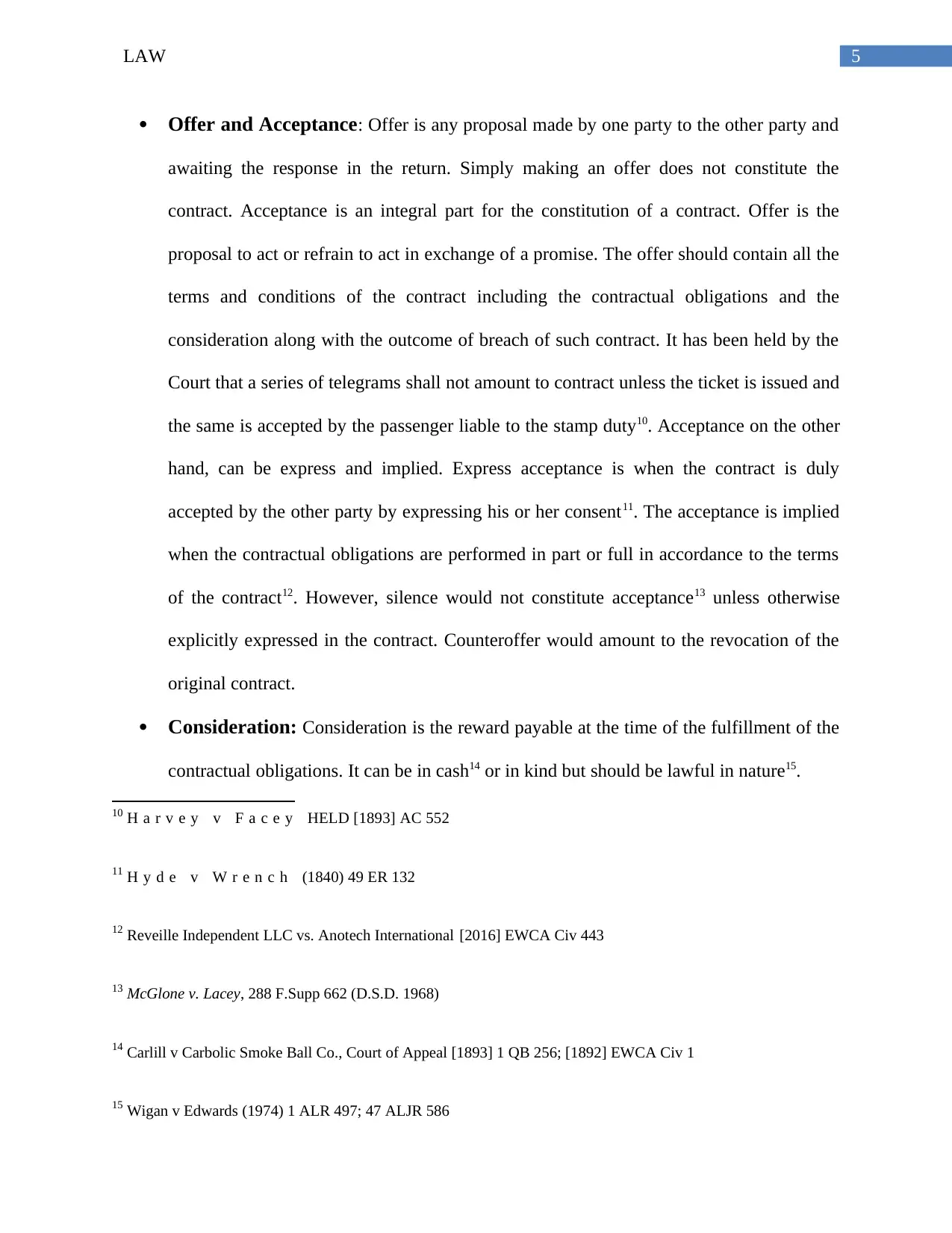
5LAW
Offer and Acceptance: Offer is any proposal made by one party to the other party and
awaiting the response in the return. Simply making an offer does not constitute the
contract. Acceptance is an integral part for the constitution of a contract. Offer is the
proposal to act or refrain to act in exchange of a promise. The offer should contain all the
terms and conditions of the contract including the contractual obligations and the
consideration along with the outcome of breach of such contract. It has been held by the
Court that a series of telegrams shall not amount to contract unless the ticket is issued and
the same is accepted by the passenger liable to the stamp duty10. Acceptance on the other
hand, can be express and implied. Express acceptance is when the contract is duly
accepted by the other party by expressing his or her consent11. The acceptance is implied
when the contractual obligations are performed in part or full in accordance to the terms
of the contract12. However, silence would not constitute acceptance13 unless otherwise
explicitly expressed in the contract. Counteroffer would amount to the revocation of the
original contract.
Consideration: Consideration is the reward payable at the time of the fulfillment of the
contractual obligations. It can be in cash14 or in kind but should be lawful in nature15.
10 H a r v e y v F a c e y HELD [1893] AC 552
11 H y d e v W r e n c h (1840) 49 ER 132
12 Reveille Independent LLC vs. Anotech International [2016] EWCA Civ 443
13 McGlone v. Lacey, 288 F.Supp 662 (D.S.D. 1968)
14 Carlill v Carbolic Smoke Ball Co., Court of Appeal [1893] 1 QB 256; [1892] EWCA Civ 1
15 Wigan v Edwards (1974) 1 ALR 497; 47 ALJR 586
Offer and Acceptance: Offer is any proposal made by one party to the other party and
awaiting the response in the return. Simply making an offer does not constitute the
contract. Acceptance is an integral part for the constitution of a contract. Offer is the
proposal to act or refrain to act in exchange of a promise. The offer should contain all the
terms and conditions of the contract including the contractual obligations and the
consideration along with the outcome of breach of such contract. It has been held by the
Court that a series of telegrams shall not amount to contract unless the ticket is issued and
the same is accepted by the passenger liable to the stamp duty10. Acceptance on the other
hand, can be express and implied. Express acceptance is when the contract is duly
accepted by the other party by expressing his or her consent11. The acceptance is implied
when the contractual obligations are performed in part or full in accordance to the terms
of the contract12. However, silence would not constitute acceptance13 unless otherwise
explicitly expressed in the contract. Counteroffer would amount to the revocation of the
original contract.
Consideration: Consideration is the reward payable at the time of the fulfillment of the
contractual obligations. It can be in cash14 or in kind but should be lawful in nature15.
10 H a r v e y v F a c e y HELD [1893] AC 552
11 H y d e v W r e n c h (1840) 49 ER 132
12 Reveille Independent LLC vs. Anotech International [2016] EWCA Civ 443
13 McGlone v. Lacey, 288 F.Supp 662 (D.S.D. 1968)
14 Carlill v Carbolic Smoke Ball Co., Court of Appeal [1893] 1 QB 256; [1892] EWCA Civ 1
15 Wigan v Edwards (1974) 1 ALR 497; 47 ALJR 586
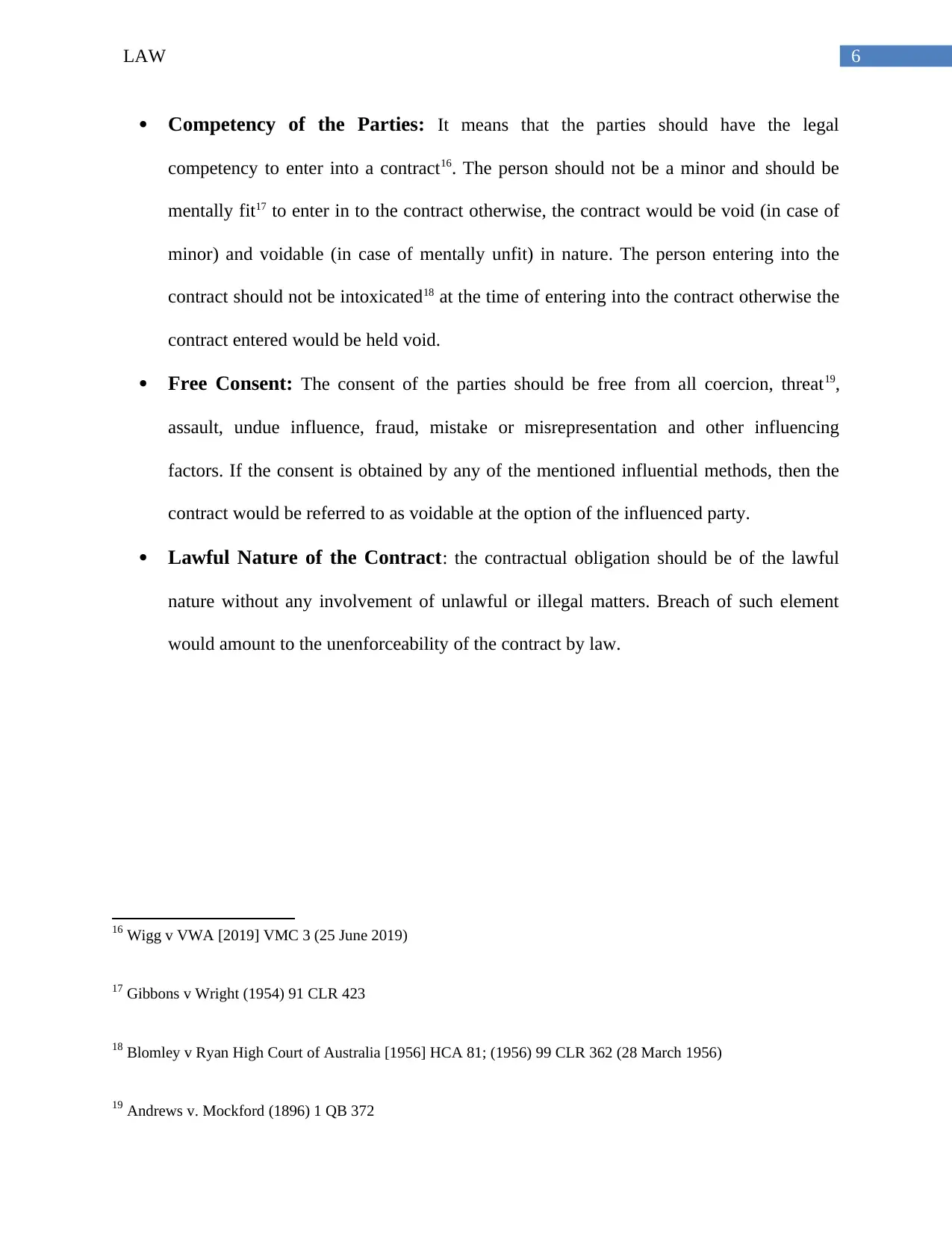
6LAW
Competency of the Parties: It means that the parties should have the legal
competency to enter into a contract16. The person should not be a minor and should be
mentally fit17 to enter in to the contract otherwise, the contract would be void (in case of
minor) and voidable (in case of mentally unfit) in nature. The person entering into the
contract should not be intoxicated18 at the time of entering into the contract otherwise the
contract entered would be held void.
Free Consent: The consent of the parties should be free from all coercion, threat19,
assault, undue influence, fraud, mistake or misrepresentation and other influencing
factors. If the consent is obtained by any of the mentioned influential methods, then the
contract would be referred to as voidable at the option of the influenced party.
Lawful Nature of the Contract: the contractual obligation should be of the lawful
nature without any involvement of unlawful or illegal matters. Breach of such element
would amount to the unenforceability of the contract by law.
16 Wigg v VWA [2019] VMC 3 (25 June 2019)
17 Gibbons v Wright (1954) 91 CLR 423
18 Blomley v Ryan High Court of Australia [1956] HCA 81; (1956) 99 CLR 362 (28 March 1956)
19 Andrews v. Mockford (1896) 1 QB 372
Competency of the Parties: It means that the parties should have the legal
competency to enter into a contract16. The person should not be a minor and should be
mentally fit17 to enter in to the contract otherwise, the contract would be void (in case of
minor) and voidable (in case of mentally unfit) in nature. The person entering into the
contract should not be intoxicated18 at the time of entering into the contract otherwise the
contract entered would be held void.
Free Consent: The consent of the parties should be free from all coercion, threat19,
assault, undue influence, fraud, mistake or misrepresentation and other influencing
factors. If the consent is obtained by any of the mentioned influential methods, then the
contract would be referred to as voidable at the option of the influenced party.
Lawful Nature of the Contract: the contractual obligation should be of the lawful
nature without any involvement of unlawful or illegal matters. Breach of such element
would amount to the unenforceability of the contract by law.
16 Wigg v VWA [2019] VMC 3 (25 June 2019)
17 Gibbons v Wright (1954) 91 CLR 423
18 Blomley v Ryan High Court of Australia [1956] HCA 81; (1956) 99 CLR 362 (28 March 1956)
19 Andrews v. Mockford (1896) 1 QB 372
⊘ This is a preview!⊘
Do you want full access?
Subscribe today to unlock all pages.

Trusted by 1+ million students worldwide
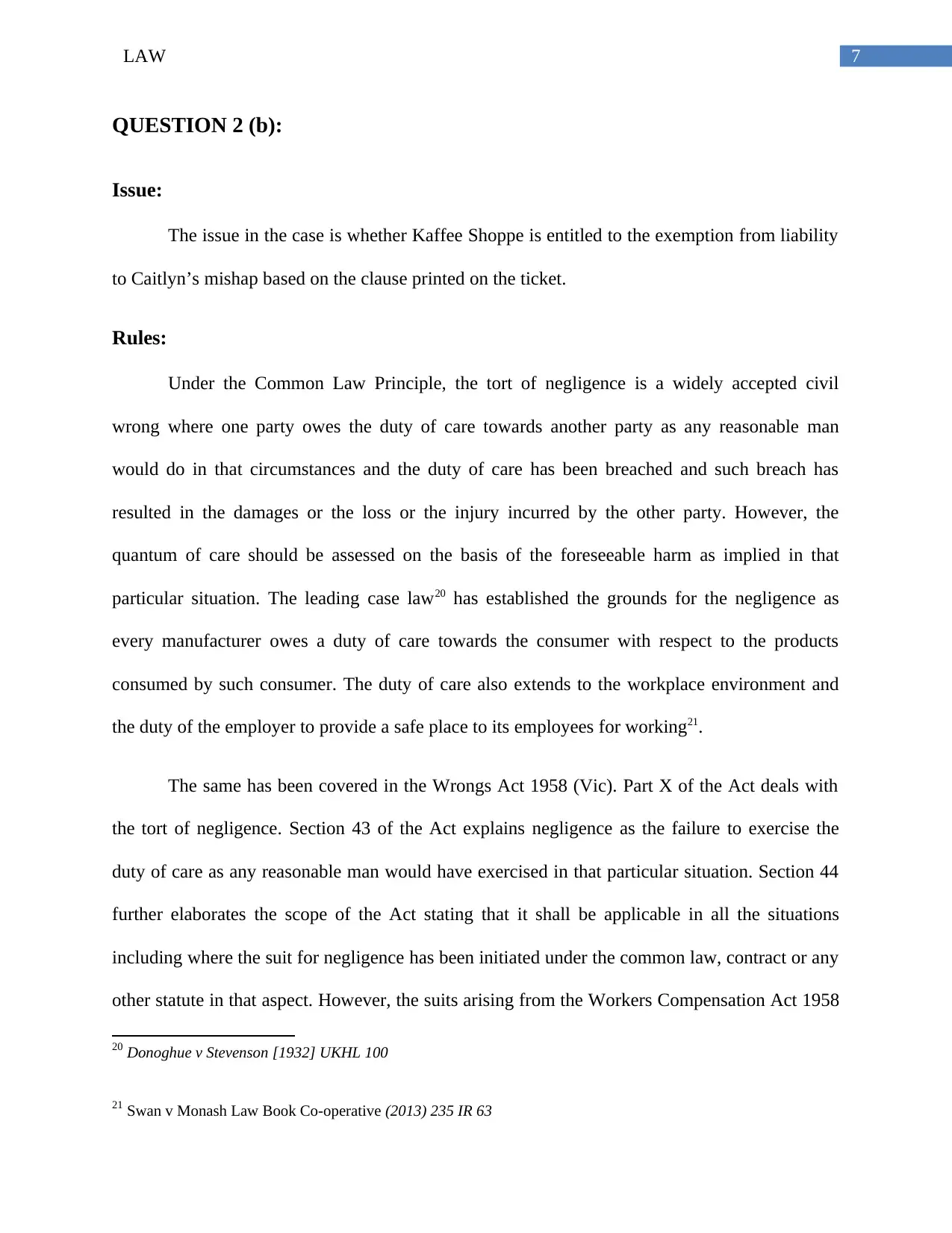
7LAW
QUESTION 2 (b):
Issue:
The issue in the case is whether Kaffee Shoppe is entitled to the exemption from liability
to Caitlyn’s mishap based on the clause printed on the ticket.
Rules:
Under the Common Law Principle, the tort of negligence is a widely accepted civil
wrong where one party owes the duty of care towards another party as any reasonable man
would do in that circumstances and the duty of care has been breached and such breach has
resulted in the damages or the loss or the injury incurred by the other party. However, the
quantum of care should be assessed on the basis of the foreseeable harm as implied in that
particular situation. The leading case law20 has established the grounds for the negligence as
every manufacturer owes a duty of care towards the consumer with respect to the products
consumed by such consumer. The duty of care also extends to the workplace environment and
the duty of the employer to provide a safe place to its employees for working21.
The same has been covered in the Wrongs Act 1958 (Vic). Part X of the Act deals with
the tort of negligence. Section 43 of the Act explains negligence as the failure to exercise the
duty of care as any reasonable man would have exercised in that particular situation. Section 44
further elaborates the scope of the Act stating that it shall be applicable in all the situations
including where the suit for negligence has been initiated under the common law, contract or any
other statute in that aspect. However, the suits arising from the Workers Compensation Act 1958
20 Donoghue v Stevenson [1932] UKHL 100
21 Swan v Monash Law Book Co-operative (2013) 235 IR 63
QUESTION 2 (b):
Issue:
The issue in the case is whether Kaffee Shoppe is entitled to the exemption from liability
to Caitlyn’s mishap based on the clause printed on the ticket.
Rules:
Under the Common Law Principle, the tort of negligence is a widely accepted civil
wrong where one party owes the duty of care towards another party as any reasonable man
would do in that circumstances and the duty of care has been breached and such breach has
resulted in the damages or the loss or the injury incurred by the other party. However, the
quantum of care should be assessed on the basis of the foreseeable harm as implied in that
particular situation. The leading case law20 has established the grounds for the negligence as
every manufacturer owes a duty of care towards the consumer with respect to the products
consumed by such consumer. The duty of care also extends to the workplace environment and
the duty of the employer to provide a safe place to its employees for working21.
The same has been covered in the Wrongs Act 1958 (Vic). Part X of the Act deals with
the tort of negligence. Section 43 of the Act explains negligence as the failure to exercise the
duty of care as any reasonable man would have exercised in that particular situation. Section 44
further elaborates the scope of the Act stating that it shall be applicable in all the situations
including where the suit for negligence has been initiated under the common law, contract or any
other statute in that aspect. However, the suits arising from the Workers Compensation Act 1958
20 Donoghue v Stevenson [1932] UKHL 100
21 Swan v Monash Law Book Co-operative (2013) 235 IR 63
Paraphrase This Document
Need a fresh take? Get an instant paraphrase of this document with our AI Paraphraser
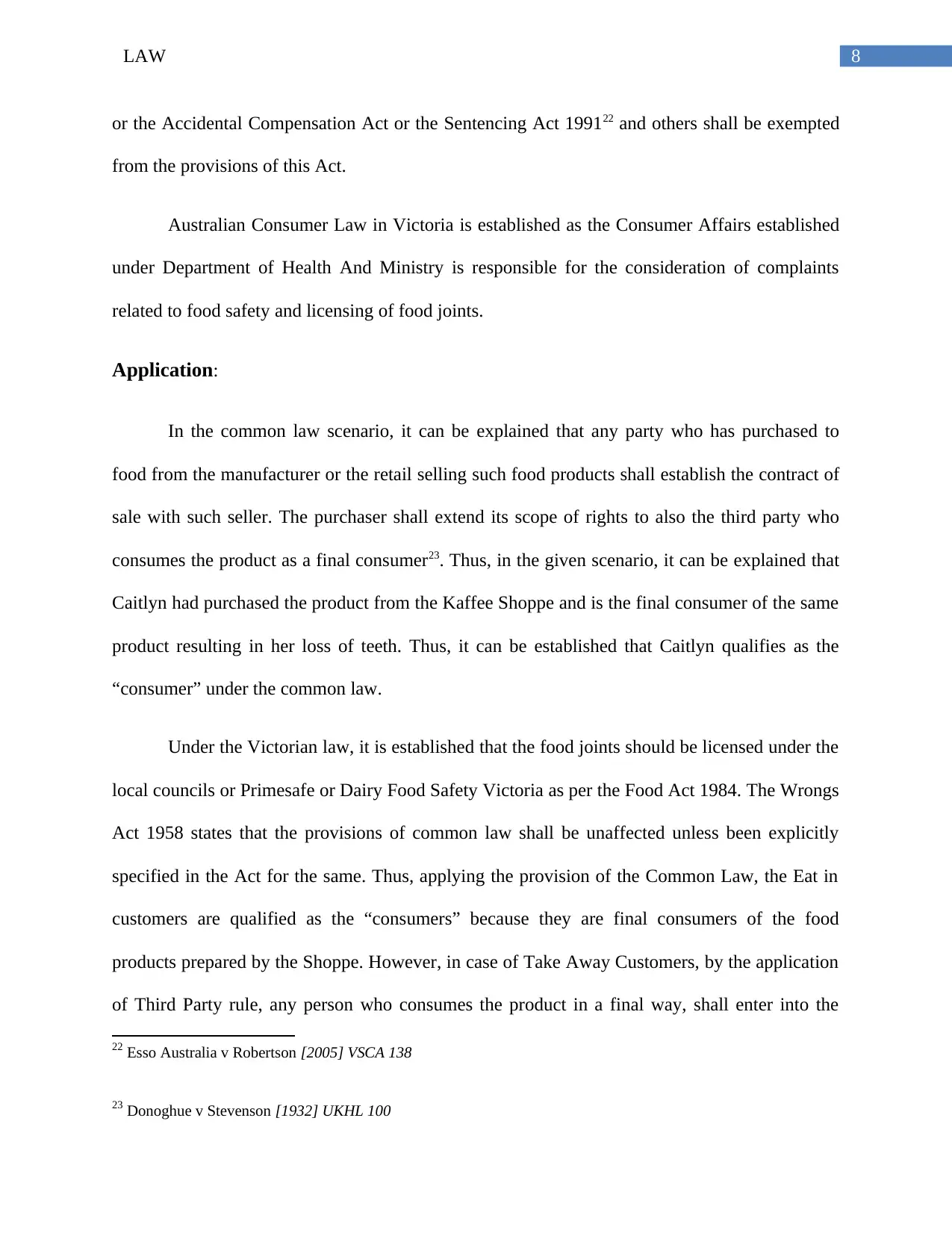
8LAW
or the Accidental Compensation Act or the Sentencing Act 199122 and others shall be exempted
from the provisions of this Act.
Australian Consumer Law in Victoria is established as the Consumer Affairs established
under Department of Health And Ministry is responsible for the consideration of complaints
related to food safety and licensing of food joints.
Application:
In the common law scenario, it can be explained that any party who has purchased to
food from the manufacturer or the retail selling such food products shall establish the contract of
sale with such seller. The purchaser shall extend its scope of rights to also the third party who
consumes the product as a final consumer23. Thus, in the given scenario, it can be explained that
Caitlyn had purchased the product from the Kaffee Shoppe and is the final consumer of the same
product resulting in her loss of teeth. Thus, it can be established that Caitlyn qualifies as the
“consumer” under the common law.
Under the Victorian law, it is established that the food joints should be licensed under the
local councils or Primesafe or Dairy Food Safety Victoria as per the Food Act 1984. The Wrongs
Act 1958 states that the provisions of common law shall be unaffected unless been explicitly
specified in the Act for the same. Thus, applying the provision of the Common Law, the Eat in
customers are qualified as the “consumers” because they are final consumers of the food
products prepared by the Shoppe. However, in case of Take Away Customers, by the application
of Third Party rule, any person who consumes the product in a final way, shall enter into the
22 Esso Australia v Robertson [2005] VSCA 138
23 Donoghue v Stevenson [1932] UKHL 100
or the Accidental Compensation Act or the Sentencing Act 199122 and others shall be exempted
from the provisions of this Act.
Australian Consumer Law in Victoria is established as the Consumer Affairs established
under Department of Health And Ministry is responsible for the consideration of complaints
related to food safety and licensing of food joints.
Application:
In the common law scenario, it can be explained that any party who has purchased to
food from the manufacturer or the retail selling such food products shall establish the contract of
sale with such seller. The purchaser shall extend its scope of rights to also the third party who
consumes the product as a final consumer23. Thus, in the given scenario, it can be explained that
Caitlyn had purchased the product from the Kaffee Shoppe and is the final consumer of the same
product resulting in her loss of teeth. Thus, it can be established that Caitlyn qualifies as the
“consumer” under the common law.
Under the Victorian law, it is established that the food joints should be licensed under the
local councils or Primesafe or Dairy Food Safety Victoria as per the Food Act 1984. The Wrongs
Act 1958 states that the provisions of common law shall be unaffected unless been explicitly
specified in the Act for the same. Thus, applying the provision of the Common Law, the Eat in
customers are qualified as the “consumers” because they are final consumers of the food
products prepared by the Shoppe. However, in case of Take Away Customers, by the application
of Third Party rule, any person who consumes the product in a final way, shall enter into the
22 Esso Australia v Robertson [2005] VSCA 138
23 Donoghue v Stevenson [1932] UKHL 100
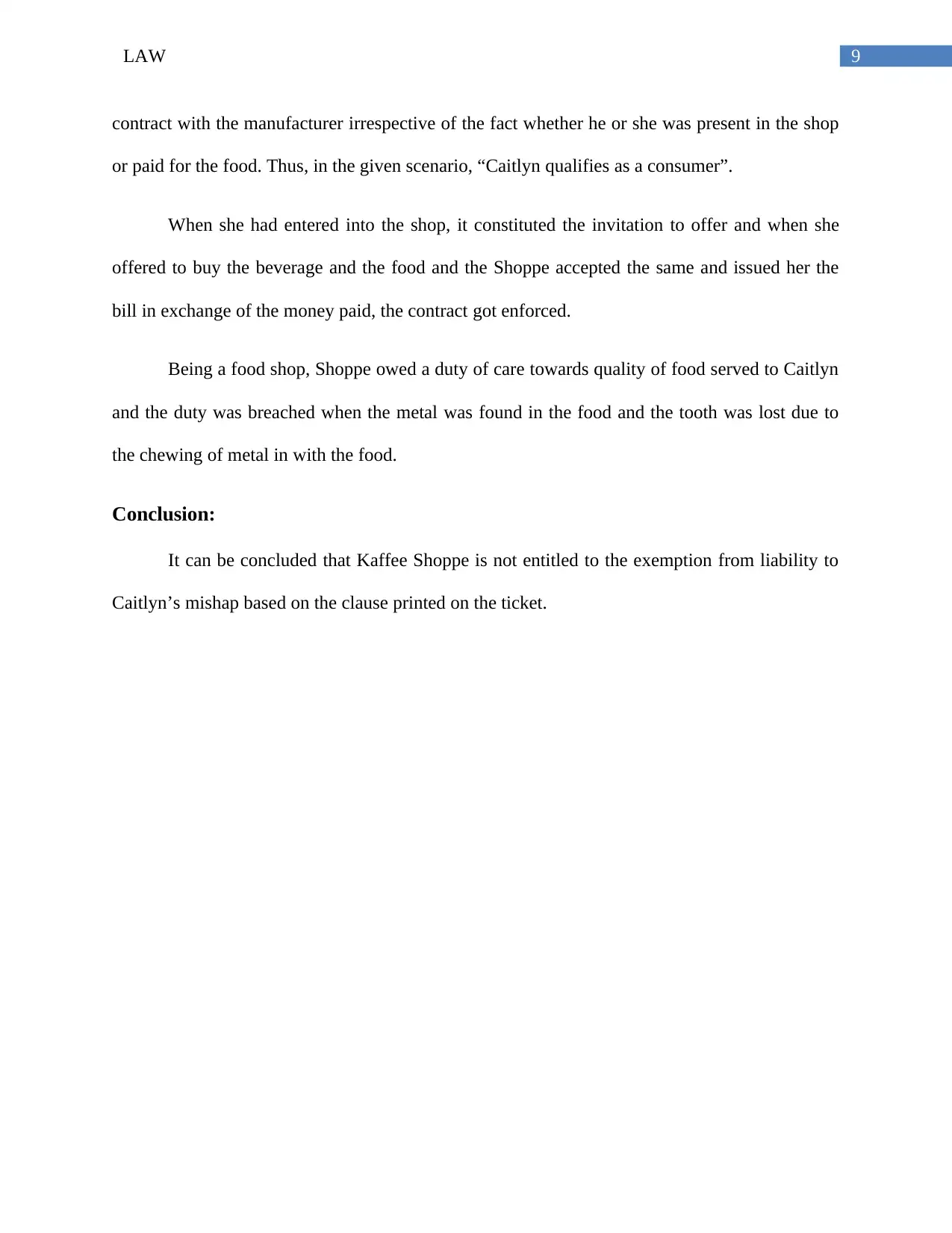
9LAW
contract with the manufacturer irrespective of the fact whether he or she was present in the shop
or paid for the food. Thus, in the given scenario, “Caitlyn qualifies as a consumer”.
When she had entered into the shop, it constituted the invitation to offer and when she
offered to buy the beverage and the food and the Shoppe accepted the same and issued her the
bill in exchange of the money paid, the contract got enforced.
Being a food shop, Shoppe owed a duty of care towards quality of food served to Caitlyn
and the duty was breached when the metal was found in the food and the tooth was lost due to
the chewing of metal in with the food.
Conclusion:
It can be concluded that Kaffee Shoppe is not entitled to the exemption from liability to
Caitlyn’s mishap based on the clause printed on the ticket.
contract with the manufacturer irrespective of the fact whether he or she was present in the shop
or paid for the food. Thus, in the given scenario, “Caitlyn qualifies as a consumer”.
When she had entered into the shop, it constituted the invitation to offer and when she
offered to buy the beverage and the food and the Shoppe accepted the same and issued her the
bill in exchange of the money paid, the contract got enforced.
Being a food shop, Shoppe owed a duty of care towards quality of food served to Caitlyn
and the duty was breached when the metal was found in the food and the tooth was lost due to
the chewing of metal in with the food.
Conclusion:
It can be concluded that Kaffee Shoppe is not entitled to the exemption from liability to
Caitlyn’s mishap based on the clause printed on the ticket.
⊘ This is a preview!⊘
Do you want full access?
Subscribe today to unlock all pages.

Trusted by 1+ million students worldwide
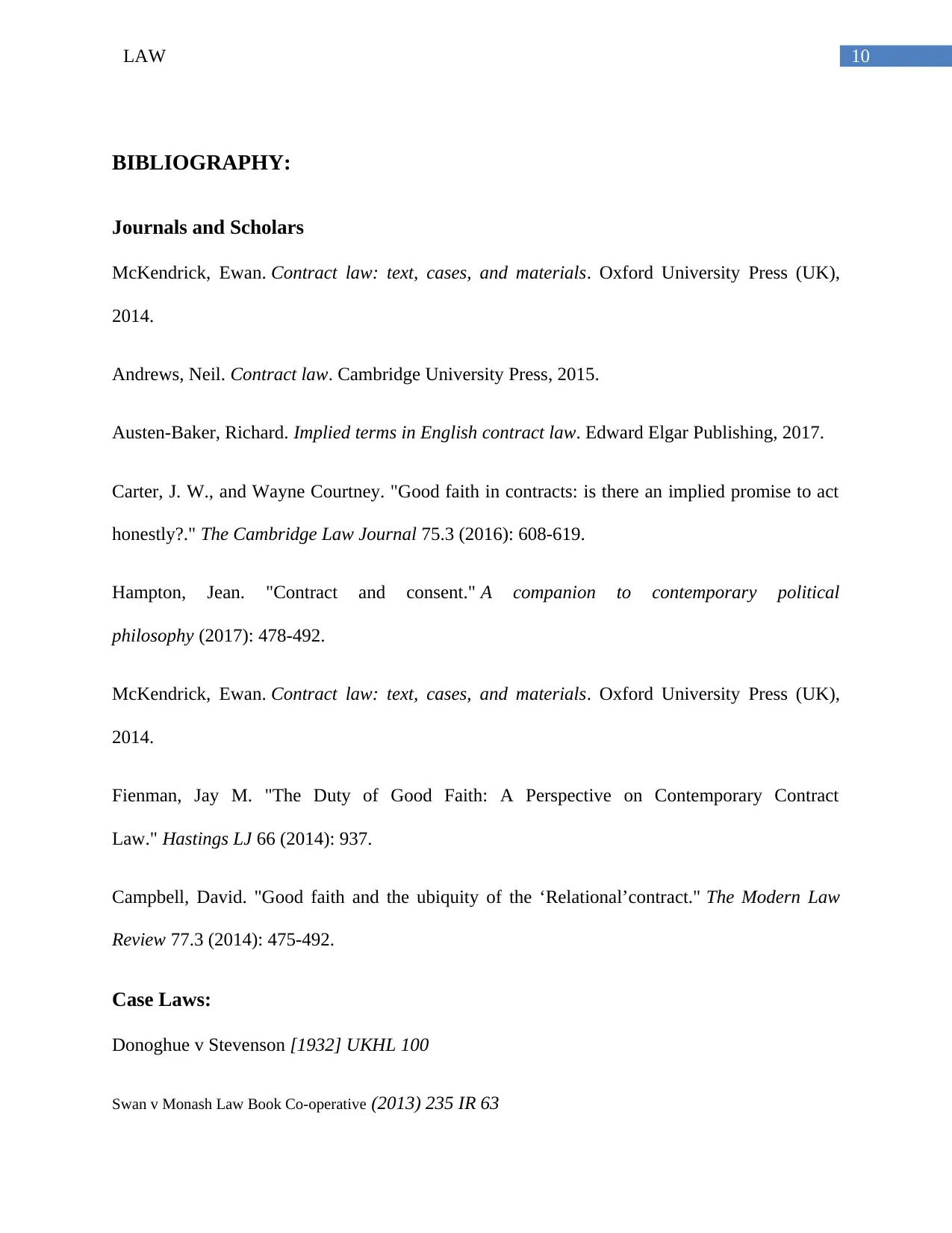
10LAW
BIBLIOGRAPHY:
Journals and Scholars
McKendrick, Ewan. Contract law: text, cases, and materials. Oxford University Press (UK),
2014.
Andrews, Neil. Contract law. Cambridge University Press, 2015.
Austen-Baker, Richard. Implied terms in English contract law. Edward Elgar Publishing, 2017.
Carter, J. W., and Wayne Courtney. "Good faith in contracts: is there an implied promise to act
honestly?." The Cambridge Law Journal 75.3 (2016): 608-619.
Hampton, Jean. "Contract and consent." A companion to contemporary political
philosophy (2017): 478-492.
McKendrick, Ewan. Contract law: text, cases, and materials. Oxford University Press (UK),
2014.
Fienman, Jay M. "The Duty of Good Faith: A Perspective on Contemporary Contract
Law." Hastings LJ 66 (2014): 937.
Campbell, David. "Good faith and the ubiquity of the ‘Relational’contract." The Modern Law
Review 77.3 (2014): 475-492.
Case Laws:
Donoghue v Stevenson [1932] UKHL 100
Swan v Monash Law Book Co-operative (2013) 235 IR 63
BIBLIOGRAPHY:
Journals and Scholars
McKendrick, Ewan. Contract law: text, cases, and materials. Oxford University Press (UK),
2014.
Andrews, Neil. Contract law. Cambridge University Press, 2015.
Austen-Baker, Richard. Implied terms in English contract law. Edward Elgar Publishing, 2017.
Carter, J. W., and Wayne Courtney. "Good faith in contracts: is there an implied promise to act
honestly?." The Cambridge Law Journal 75.3 (2016): 608-619.
Hampton, Jean. "Contract and consent." A companion to contemporary political
philosophy (2017): 478-492.
McKendrick, Ewan. Contract law: text, cases, and materials. Oxford University Press (UK),
2014.
Fienman, Jay M. "The Duty of Good Faith: A Perspective on Contemporary Contract
Law." Hastings LJ 66 (2014): 937.
Campbell, David. "Good faith and the ubiquity of the ‘Relational’contract." The Modern Law
Review 77.3 (2014): 475-492.
Case Laws:
Donoghue v Stevenson [1932] UKHL 100
Swan v Monash Law Book Co-operative (2013) 235 IR 63
Paraphrase This Document
Need a fresh take? Get an instant paraphrase of this document with our AI Paraphraser
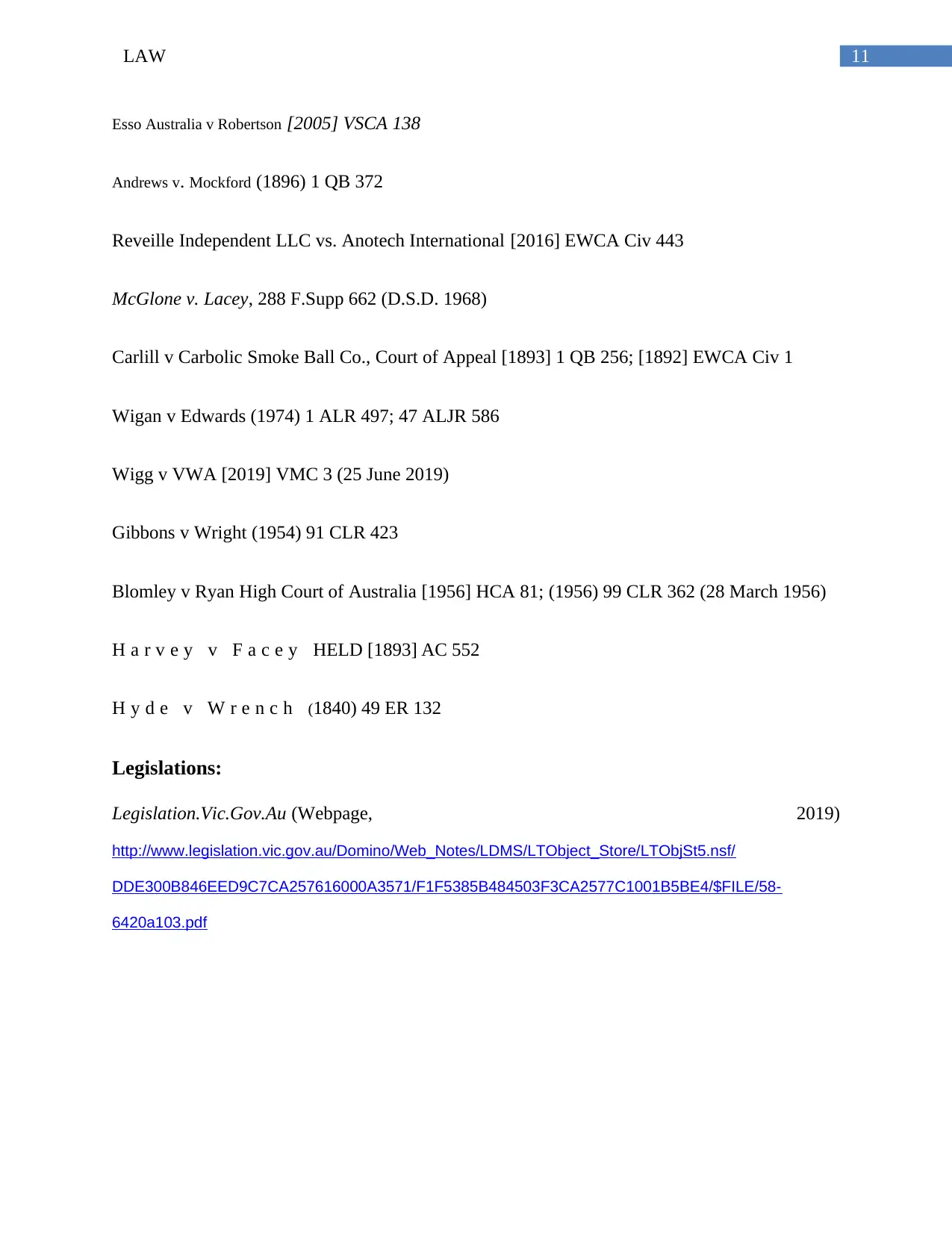
11LAW
Esso Australia v Robertson [2005] VSCA 138
Andrews v. Mockford (1896) 1 QB 372
Reveille Independent LLC vs. Anotech International [2016] EWCA Civ 443
McGlone v. Lacey, 288 F.Supp 662 (D.S.D. 1968)
Carlill v Carbolic Smoke Ball Co., Court of Appeal [1893] 1 QB 256; [1892] EWCA Civ 1
Wigan v Edwards (1974) 1 ALR 497; 47 ALJR 586
Wigg v VWA [2019] VMC 3 (25 June 2019)
Gibbons v Wright (1954) 91 CLR 423
Blomley v Ryan High Court of Australia [1956] HCA 81; (1956) 99 CLR 362 (28 March 1956)
H a r v e y v F a c e y HELD [1893] AC 552
H y d e v W r e n c h (1840) 49 ER 132
Legislations:
Legislation.Vic.Gov.Au (Webpage, 2019)
http://www.legislation.vic.gov.au/Domino/Web_Notes/LDMS/LTObject_Store/LTObjSt5.nsf/
DDE300B846EED9C7CA257616000A3571/F1F5385B484503F3CA2577C1001B5BE4/$FILE/58-
6420a103.pdf
Esso Australia v Robertson [2005] VSCA 138
Andrews v. Mockford (1896) 1 QB 372
Reveille Independent LLC vs. Anotech International [2016] EWCA Civ 443
McGlone v. Lacey, 288 F.Supp 662 (D.S.D. 1968)
Carlill v Carbolic Smoke Ball Co., Court of Appeal [1893] 1 QB 256; [1892] EWCA Civ 1
Wigan v Edwards (1974) 1 ALR 497; 47 ALJR 586
Wigg v VWA [2019] VMC 3 (25 June 2019)
Gibbons v Wright (1954) 91 CLR 423
Blomley v Ryan High Court of Australia [1956] HCA 81; (1956) 99 CLR 362 (28 March 1956)
H a r v e y v F a c e y HELD [1893] AC 552
H y d e v W r e n c h (1840) 49 ER 132
Legislations:
Legislation.Vic.Gov.Au (Webpage, 2019)
http://www.legislation.vic.gov.au/Domino/Web_Notes/LDMS/LTObject_Store/LTObjSt5.nsf/
DDE300B846EED9C7CA257616000A3571/F1F5385B484503F3CA2577C1001B5BE4/$FILE/58-
6420a103.pdf
1 out of 11
Related Documents
Your All-in-One AI-Powered Toolkit for Academic Success.
+13062052269
info@desklib.com
Available 24*7 on WhatsApp / Email
![[object Object]](/_next/static/media/star-bottom.7253800d.svg)
Unlock your academic potential
Copyright © 2020–2026 A2Z Services. All Rights Reserved. Developed and managed by ZUCOL.




